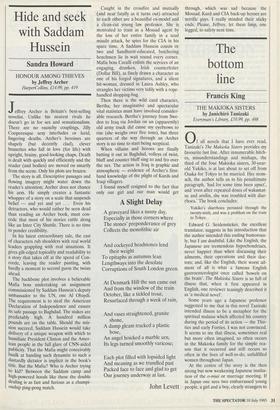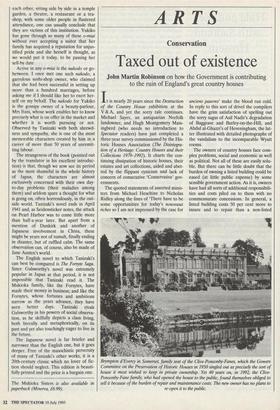The bottom line
Francis King
THE MAKIOKA SISTERS by Junichiro Tanizaki Everyman's Library, £10.99, pp. 498 Of all novels that I have ever read, Tanizaki's The Makioka Sisters provides my favourite last line. After innumerable hitch- es, misunderstandings and mishaps, the third of the four Makioka sisters, 30-year- old Yukiko, is at last about to set off from Osaka for Tokyo to be married. Her stom- ach, the author tells us in his penultimate paragraph, 'had for some time been upset', and 'even after repeated doses of wakamat- su and arsilin, she was troubled with diar- rhoea.' The book concludes:
Yukiko's diarrhoea persisted through the twenty-sixth, and was a problem on the train to Tokyo.
Edward G. Seidensticker, the excellent translator, suggests in his introduction that the author intended this ending humorous- ly, but I am doubtful. Like the English, the Japanese are tremendous hypochondriacs, never happier than when discussing their ailments, their operations and their doc- tors; and, like the English, their worst ail- ment of all is what a famous English gastroenterologist once called 'bowels on the brain'. The Makioka Sisters is so full of illness that, when it first appeared in English, one reviewer teasingly described it as 'a medical novel'.
Some years ago a Japanese professor suggested to me that in this novel Tanizaki intended illness to be a metaphor for the spiritual malaise which affected his country during the period of its action — the Thir- ties and early Forties. I was not convinced. It seems to me that illness, sometimes real but more often imagined, so often occurs in the Makioka family for the simple rea- son that it occurred and still occurs so often in the lives of well-to-do, unfulfilled women throughout Japan.
At the centre of the story is the then strong but now weakening Japanese institu- tion of the o-miai or marriage meeting. If in Japan one sees two embarrassed young people, a girl and a boy, clearly strangers to each other, sitting side by side in a temple garden, a theatre, a restaurant or a tea- shop. with some older people in flustered attendance, one can usually conclude that they are victims of this institution. Yukiko has gone through so many of these o-miai without ever accepting a suitor that her family has acquired a reputation for unjus- tified pride and she herself is thought, as we would put it today, to be passing her sell-by date Active in any o-miai is the nakodo or go- between. I once met one such nakodo, a garrulous sushi-shop owner, who claimed that she had been successful in setting up more than a hundred marriages, before asking me if I should like her to exert her- self on my behalf. The nakodo for Yukiko is the gossipy owner of a beauty-parlour, Mrs Itani, whose work enables her to know precisely what is on offer in the market and whether it is worth pursuing or not. Observed by Tanizaki with both shrewd- ness and sympathy, she is one of the most memorable characters created by him in a career of more than 50 years of unremit- ting labour.
The strangeness of the book (pointed out by the translator in his excellent introduc- tion) is that, though we now see its period as the most shameful in the whole history of Japan, the characters are almost exclusively concerned with their own day- to-day problems (their maladies among them) and seldom spare a thought for what is going on, often horrendously, in the out- side world. Tanizaki's novel ends in April 1941 and, as Seidensticker notes, the attack on Pearl Harbor was to come little more than half-a-year later. But apart from a mention of Dunkirk and another of Japanese involvement in China, these might be years not of tumult, finally ending in disaster, but of ruffled calm. The same observation can, of course, also be made of Jane Austen's world.
The English novel to which Tanizaki's can best be compared is The Forsyte Saga. Since Galsworthy's novel was extremely popular in Japan at that period, it is not impossible that Tanizaki read it. The Makioka family, like the Forsytes, have made their money in business; and like the Forsytes, whose fortunes and ambitions narrow as the years advance, they have seen better days. Tanizaki rivals Galsworthy in his powers of social observa- tion, as he skilfully depicts a class living, both literally and metaphorically, on its past and yet also touchingly eager to live in the future.
The Japanese novel is far briefer and narrower than the English one, but it goes deeper. Free of the masochistic perversity of many of Tanizaki's other works, it is a 20th-century classic which no lover of fic- tion should neglect. This edition is beauti- fully printed and the price is a bargain one.
The Makioka Sisters is also available in paperback (Minerva, f6.99).



















































 Previous page
Previous page